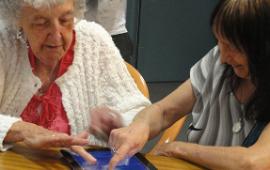Engaging older adults through touch tablets

In Summary
- This article featured in Swinburne’s 2017 ‘Research Impact’ magazine, produced in association with Nature Publishing Group.
A new check-in system for elderly people, designed with their emotional needs in mind, has proved successful in early trials.
Director of Swinburne’s Future Self and Design Living Lab, Associate Professor Sonja Pedell, is part of a global movement of designers that believes end-users should be partners in the search for solutions to their problems.
Associate Professor Pedell, along with Emeritus Professor Leon Sterling and other members of the Centre for Design Innovation, turned their attention to emergency alarms for vulnerable Australians, such as the elderly; a research project supported by the Smart Internet Cooperative Research Centre and the Australian Research Council.
They found that older people felt home-based emergency alarms and wellbeing check systems were like “cowbells” forced on them.
In response, the research team developed an iPad-based, picture-frame system that allows older people to receive photographs and messages from loved-ones each day.
When the participants responded to these messages, community service providers and carers would be assured that they were OK.
The prototype was embraced by carers such as ‘Joe’, who felt it helped in sharing the care of an aged relative: “You can build a network of support,” Joe said. “It shares the exposure and the responsibility.”
Associate Professor Pedell said elderly users were also more engaged with the iPad system because it increased their contact with family and friends.
“From an emotional point of view, people were feeling not only cared for, but also cared about, and that is a critical difference,” she said.
Pedell says while technology had the potential to improve the lives of the elderly, it often fell short because it did not address their emotional requirements.
She aimed to overcome that through an “emotion-led approach [to design] where we ask the end-users, ‘how would you like to feel?’”
“The idea is listening to what people want and taking their desires and needs very seriously to develop technologies that better meet them,” she said.
Through the Future Self project in the Centre for Design Innovation and the Living Lab, Pedell and her colleagues were also investigating the use of music and humanoid robots to increase socialisation among dementia sufferers, and refurbishment innovations in older people’s homes.
Although fledgling, the work at Swinburne’s Living Lab has been recognised with membership to the European Network of Living Labs, a move Pedell said was already fostering global collaborations.

